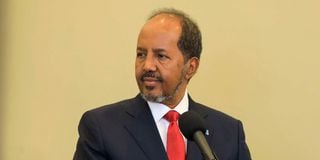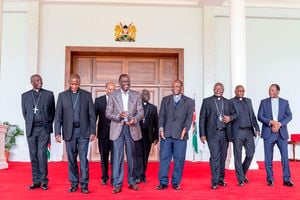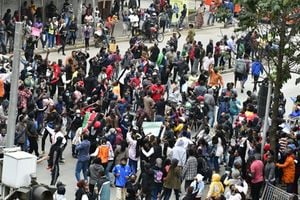Somalia elected non-permanent member of the UN Security Council

President Hassan Sheikh Mohamud of Somalia.
What you need to know:
- Being a member of the Council is a turnaround for Somalia’s stature.
- Somali had been under UN sanctions until only last December.
Somalia was on Thursday elected a non-permanent member of the UN Security Council.
During a vote in the UN General Assembly, Somalia received a total endorsement from Africa and earned 179 votes, more than the two-thirds majority needed to be elected.
For the last two decades, the UN Security Council has been a source of punishment for Mogadishu with sanctions and embargoes.
Somalia had last served on the Council in 1971-72 term, during the reign of the Siad Barre regime.
The new endorsement means Somalia will serve on the UN’s most powerful organ of 15 members from January 2025 to December 2026.
It will replace Mozambique as the African representative whose term ends in December this year.
Other countries elected to the body include Pakistan, Panama, Greece and Denmark who will replace Malta, Ecuador, Japan, and Switzerland respectively.
Being a member of the Council is a turnaround for Somalia’s stature on the international stage.
Somalia had been under UN sanctions until last December when it was finally allowed to purchase its own weapons to upgrade the military.
Its international debts were also forgiven around the same time and it was admitted to the East African Community, a bloc of 8 member states in the eastern Africa region.
The Council has 15 members with five permanent members - US, UK, France, China and Russia - carrying veto powers on substantive issues.
The other 10 are usually elected in a rotational format with Africa given three slots on the Council.
Somalia was elected unopposed by the UN General Assembly after the African Union agreed in principle to endorse Mogadishu earlier this year.
It will not be able to make decisions on substantive issues such as who to sanction or which sanctions to lift, for example. But it gives it closer contacts to lobby for favourable decisions for itself and Africa.
It will mostly also speak for the continent, under an arrangement known as A3 and it will be interesting to see how it contributes to Africa’s enduring conflicts like the DRC, South Sudan, Sudan, Ethiopia and its own situation of state rebuilding.
Yet experts say Somalia’s position could still come under external pressure.
“What will constitute success during your term? What’s failing? Are your President/Prime Minister, Foreign Minister, and Permanent Representative in sync, or will the pressures and political prestige of the Council pull you apart?” posed Dr Martin Kimani, Kenya’s outgoing Permanent Representative to the UN, who served on the Council in 2021-2022.
“Are you prepared to take a stance that might be unpopular with powerful friends and allies? There’s nowhere to hide in the Council.
“How will you effectively work with the P5 and the Africa 3? What special insight do you have that can educate the Council?”
The decisions of the UN Security Council are binding to all UN member states but the permanent five have recently come under accusation of using the veto powers to settle political scores and limit the the Council’s responses to crises.





